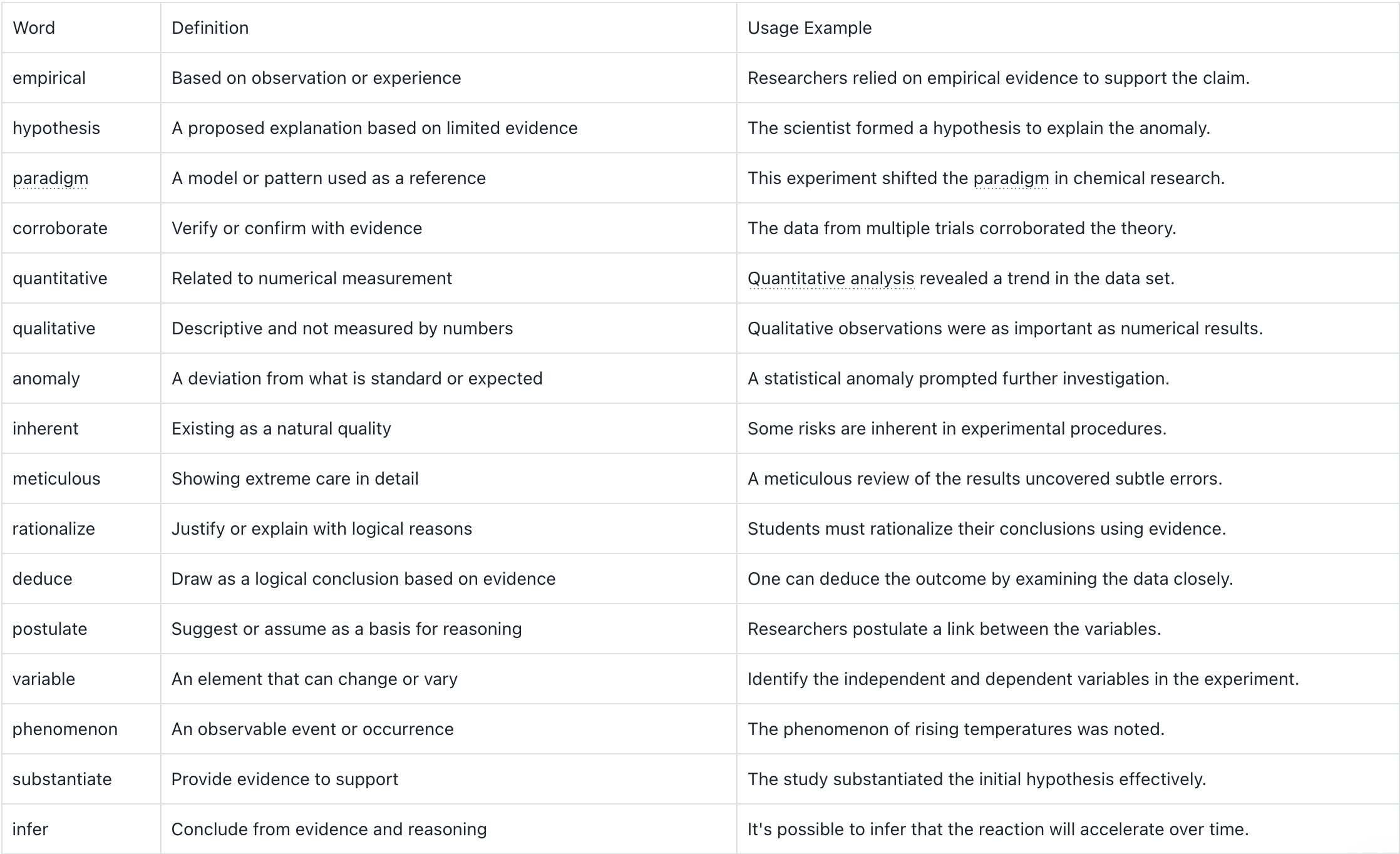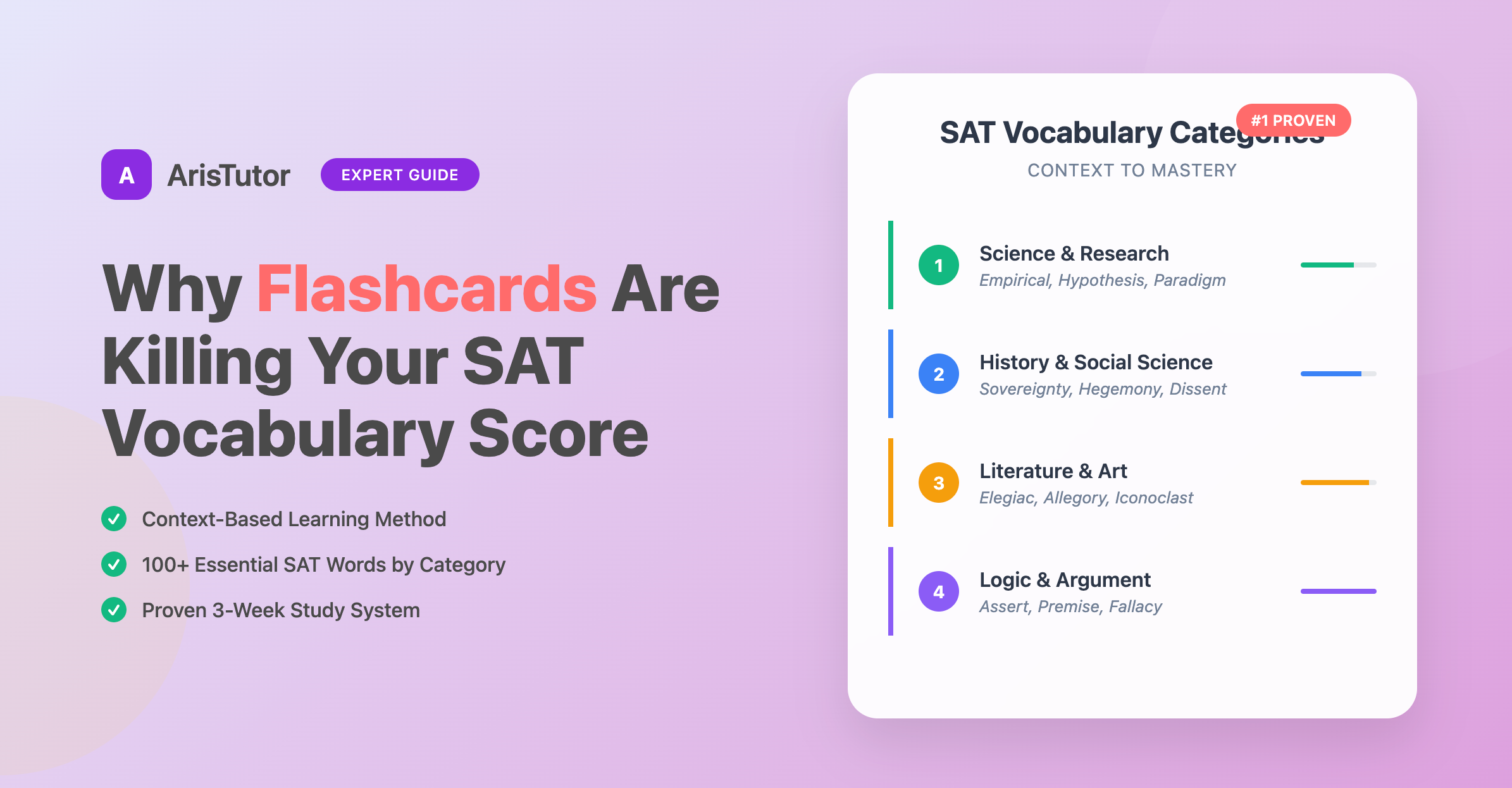Description:
Master SAT vocabulary through context-based learning instead of flashcards. Get proven strategies for science, history, and literature passages on the 2025 Digital SAT.
1. Introduction: Why Your Flashcards Aren't Working
Flashcards don't work well for SAT vocabulary. Students have used them to learn words for many years, but I've seen how this method fails to help with real test questions. The biggest problem is that flashcards show words without any surrounding text or meaning. When students just memorize definitions from cards, they miss learning how words work in actual SAT reading passages and questions. I've watched many students struggle with this problem during my years as a tutor.
Words on the Digital SAT appear in passages about many different topics. Simply knowing what a word means isn't enough anymore. Instead of using flashcards, students should practice seeing vocabulary in different contexts, like science articles or history texts. This method helps students truly understand words and remember them better. By learning words through real reading passages, students develop a deeper understanding that helps them on test day.
Reading passages on the SAT contain many layers of meaning. Your brain needs to recognize how words connect to bigger ideas in the text. My own scores improved a lot when I stopped using flashcards and started learning words through themed reading practice. This guide will show you how to move beyond basic memorization to really understand and use SAT vocabulary words.
Module 1 – The Language of Science & Research
Science vocabulary helps students understand research and experiments better. Every day in my tutoring sessions, I notice how students who know these words do much better on science reading passages. Learning these words in real contexts helps you understand difficult science texts and make sense of data-driven stories. For a complete guide to SAT vocabulary, visit Digital SAT Vocabulary Guide.
Here are 25 key science terms you need to know for the SAT:


Practice these SAT-style questions:
1.In a passage detailing an experiment, the term "empirical" most nearly means:
A. Theoretical
B. Experimental
C. Hypothetical
D. Speculative
2.When a researcher "corroborates" an observation, she is most likely:
A. Disproving it
B. Confirming it
C. Ignoring it
D. Modifying it
3.The passage suggests that "anomaly" refers to an observation that:
A. Aligns perfectly with expectations
B. Deviates from the norm
C. Is predictable
D. Is typical in nature
3.In context, "variable" is best understood as:
A. A constant factor
B. A value subject to change
C. A fixed measurement
D. An irrelevant detail
4.The scientist's use of "synthesize" implies that she is:
A. Separating components
B. Combining elements into a new whole
C. Discarding inconsistent data
D. Evaluating only one factor
Using these words in your study sessions will help you understand complex SAT passages better. Remember to practice with real SAT questions often.
The Language of History & Social Science
Understanding history and social science words helps you do better on the Digital SAT. Since working with students, I have seen how knowing about government and society improves test scores. Students who understand major events like the American Revolution can better grasp what words like "sovereignty" and "ideology" mean in context. These words connect to real events and changes in society. When you know these terms well, you can better understand complex readings on the test.
Practice these SAT-style questions:
1.In a passage discussing post-colonial governance, "sovereignty" most nearly means:
A. Administrative control
B. Supreme authority
C. Economic power
D. Social influence
2.When a historical text mentions "dissent," it implies:
A. Proud support
B. Productive collaboration
C. Disagreement
D. Silent acceptance
3.The term "hegemonic" in an economic context best aligns with:
A. Equal distribution
B. Predominant influence
C. Financial instability
D. Administrative inefficiency
4.In context, "bureaucracy" most likely describes:
A. A streamlined system
B. An unregulated market
C. A complex administrative system
D. A democratic process
5.A passage highlighting "urbanization" would most likely discuss:
A. Rural decline
B. Industrial regression
C. Economic stability
D. Population growth
Knowing these words in their proper context will help you handle tough SAT passages with greater confidence.
The Language of Literature & Art Criticism
Learning literary vocabulary is key to doing well on the SAT. Students need to know both what words mean and how they affect the way a passage feels. These terms shape how readers interpret stories and essays on the test.
The following list of 25 terms will help you analyze SAT reading passages deeply. Each word comes with a clear definition and an example showing how it creates certain moods and feelings.
Try these SAT-style practice questions to test your understanding:
1.In a passage where an author uses the term "elegiac," the mood is most likely:
A. Joyful
B. Melancholic
C. Indifferent
D. Ironic
2.A critic describes a novel as having "vivid imagery." This suggests that the text:
A. Relies on abstract concepts
B. Evokes strong visual impressions
C. Has a monotonous style
D. Is overly simplistic
3.When encountering an "allegory," a reader should primarily look for:
A. Literal descriptions
B. Hidden symbolic meanings
C. Colloquial language
D. Factual details
4.A "paradoxical" statement in a literary work is most likely used to:
A. Simplify a concept
B. Highlight a contradiction
C. Summarize a plot point
D. Illustrate a fact
5.The term "iconoclast" in a review indicates that the subject is:
A. Conformist
B. Unconventional
C. Predictable
D. Traditional
Knowing these terms will make you a stronger reader. Regular practice with this vocabulary helps students understand complex passages and answer questions with confidence.
The Language of Logic & Argument
The SAT heavily tests logical reasoning. Students who master key terms for arguments do much better on the test, and I've seen this many times in my teaching career. Understanding how to break down arguments helps you read smarter and spot important details, making passage analysis much clearer and faster. Seeing the structure of arguments lets you follow an author's thinking step by step.
The 25 words below will boost your ability to handle tough reading passages:When you practice with these words, focus on real test questions like these:
1.In an argumentative passage, the term "assert" most nearly means:
A. Question
B. Declare
C. Predict
D. Conclude
2.When an author presents a "rebuttal," she is most likely:
A. Supporting her earlier claims
B. Modifying her position
C. Countering an opposing argument
D. Introducing a new premise
3.The passage uses "premise" to indicate:
A. A supporting detail
B. The foundation of an argument
C. A concluding remark
D. An irrelevant fact
4.If a passage requires you to "synthesize" viewpoints, you are expected to:
A. Isolate a single perspective
B. Combine information to form a new perspective
C. Discard unrelated ideas
D. Repeat the presented facts
5.In context, "fallacy" is best understood as:
A. A persuasive statement
B. A logical error
C. A proven fact
D. An irrelevant opinion
For more help, check out the SAT Vocabulary Words: Digital SAT Attempt.
6. Your Complete SAT Vocabulary & Practice System
Set up a weekly plan to study SAT vocabulary that matches real test conditions. Each week, you should work on two different types of words and practice them in different ways using real SAT questions.
In Week 1, study words from science, research, history, and social science passages. Look over word lists and their meanings using real test passages for two days, and then work on practice questions for the next three days with these words.
Week 2 covers words from literature, art reviews, and debate-style writing. First spend 30 minutes marking up practice passages with these words. Then use another 30 minutes to break down how authors use these words to make their points or describe artwork.
During Week 3, mix up your practice between all the different types of words you've learned. Write down any mistakes you make and why you made them.
Take a practice SAT section test every week to see how well you're doing. This will help you know which areas need more work.
Use online tools like SAT VOCAB 2025 Flashcards or free real questions practice on Aristutor to to help you remember the words better. Combining regular review with real practice will help you build a strong vocabulary and feel more confident on test day.
Your brain needs to both know the words and understand how they're used in different situations. This complete system will help you get ready for the Digital SAT's vocabulary questions.
FAQ
1.Q: How many vocabulary words should I learn for the 2025 Digital SAT?
A: Focus on learning 75-100 core words across science, history, and literature categories, emphasizing understanding them in context.
2.Q: Why are flashcards not effective for SAT vocabulary preparation?
A: Flashcards lack context and real-world application, making it difficult to understand how words are used in actual SAT passages.
3.Q: What's the best way to learn SAT vocabulary in 2025?
A: Practice with themed reading passages in science, history, and literature, focusing on understanding words in their natural context.
4.Q: How long should I spend studying SAT vocabulary?
A: Dedicate 2-3 weeks to systematic vocabulary study, spending 30 minutes daily on contextual reading and practice questions.
5.Q: Will vocabulary be important on the 2025 Digital SAT?
A: Yes, vocabulary remains crucial but focuses more on understanding words in context rather than memorizing definitions.
